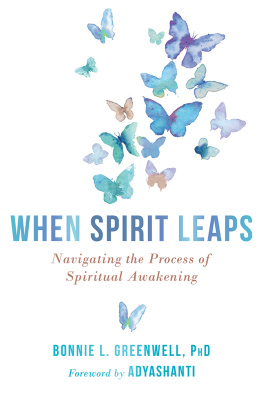Some names have been changed to protect identities. In a few instances timelines and events have been compressed.
Introduction
WE SHALL NOT CEASE FROM EXPLORATION
AND THE END OF ALL OUR EXPLORING
WILL BE TO ARRIVE WHERE WE STARTED
AND KNOW THE PLACE FOR THE FIRST TIME .
T. S. ELIOT, FOUR QUARTETS
One day when I was sitting in the carpool line waiting to pick my son up from school, it occurred to me that I had been sleepwalking through my life. This realization wasnt precipitated by some traumatic event. I did not have cancer. My parents had not abused me. I was in a good marriage to a kind man. But something wasnt right. I felt emptyan unrelenting, existential kind of emptiness. By all markers I was living a happy enough existence, but somehow I wasnt feeling it.
I had the sense that darker times were comingany fool knows an abundance of light casts a long shadow. Still, right now I was well. I knew exactly how my afternoon would unfold. In a few minutes I would spy my son walking down the street swinging his backpack. We would stop at the market on our way home and buy a chicken to roast for dinner and some cream for our morning coffeeall those simple pleasures awaited me. It was a perfectly lovely moment. Why then, wasnt I inside of it? How had I slipped away? And most important, could I pull myself back?
The Slippery Year is the story of how I come to terms with my happily ever after. Its a conversationpersonal and universal, funny and heartrendingabout all the things that matter: children, the Sunday paper, sisters, good-hair days, dogs, love, loss, the passage of time, and all the reasons to go on living even when the only thing we can be sure of is that one day it will all end.
So who am I? I am a woman who forgot Julia Child came to my house for dinner (she came to my engagement party, tooI forgot that as well). I am a woman who is discovering the advantages of invisibility (I finally have a superpower), a woman who wants to fall in love with her husband all over again (if only he would stop buying vans on the Internet). I am one of the millions who is currently walking around in a daze, no longer recognizing herself, wondering Is this all there is?
This is the story of my slippery year.
September
W HENEVER MY HUSBAND CASUALLY SAYS, HEY, HON, COME TAKE A LOOK at this Web site, I know its going to cost me. All of our largest purchases have been preceded by my being summoned to his computer in this manner. So when he says this a few weeks before his birthday, I knew its really going to cost me, and I dont mean just financially.
Check this out, he says, pointing. Isnt it cool?
I glance at the Ford E-350 on his screen. It looks like the sort of vehicle that shuttles retirees to the local mall. Kind of, I reply.
He frowns and says, Its not just any old van. Its a camper. It would be perfect for us. You said you wanted to see the West.
I do want to see the West, in theory anyway. In fact, seeing the West was one of the reasons we moved with our nine-year-old son, Ben, to California. But travel takes so much planning, and as Ive gotten older Im increasingly less willing to tolerate discomfort: the crowds, the traffic, everybody trying to reach the same place at the same time.
His fingers pound at the keyboard. Its got captains seats.
Whats a captains seat?
That means its very, very comfortable.
Nice, I say, getting back to my book.
Ten minutes later, he says, Im going to get one for us.
Us? I say.
Yes, usyou know, you and me?
The subtext being: Arent you lucky you married a man who wants to buy a family van as his midlife-crisis vehicle instead of a Porsche Carrera GT?
The good news is he finds a used van. The bad news is its in South Dakota. So he pays somebody to fly to South Dakota, pick up the van and drive it back.
Its an amazing deal, he says. It only has fifteen thousand miles on it, and the woman is a motivated seller.
Once the van is on its way, my husband tells me the truth. The woman was not the original owner; her son was, or had been. He bought the van to go kayaking in the most untouched places. Then one day he went out in his boat and never returned. This van delivered him to his death. And now his heartbroken mother had sold it to us.
You have to give it back, I tell him. He died in it.
He didnt die in it. He died in his kayak.
Well, he might as well have died in the van, I say. He was in the van right before he died.
My husband sighs.
I want him to be happy, us to be happy. It seems every day we hear that another couple has decided to call it quits. More often than not in our circle, the wife leaves the husband. When talking divorce with these womenmothers, like me, of school-age childrenwe speak in a shorthand that ricochets around in my head like the rhymes of Dr. Seuss.
They say: Feeling dead. Dead in bed. Too much snore. Theres got to be more.
I say: Turn his head. His head in bed. Youll have no more. No more snore.
Now, there are plenty of good reasons to end a marriage, but each time I hear of another impending divorce I cant help but reevaluate my own marriage. Do I want more? Does he? And how do I know if what I have is enough?
When the van finally arrives, I realize it is not the same as the one in that first picture I saw on the Web site. This is no ordinary van for transporting the elderly. Its a 44 Rock Crawler version, with tinted windows, a roof rack and a camper extension that explodes out the top. Built to climb rock gorges and traverse rivers, our van also features on its front bumper a cattle-guard contraption that must have been handy when plowing through herds of wildebeests in the Serengeti but is presumably unnecessary in the suburbs.
As I circle the van, trying to hide my shock, our neighbors drive by in their Taurus. The man sticks his head out the window, pumps his fist at my husband and gives a yodeling hoot of solidarity. The woman shrugs her shoulders at me, her face scrunched up, as if shes thinking, How will this affect our property value?
The hulking black behemoth is so big it spills out of our driveway and into the street.
Its more of a truck than a van, my husband concedes.
Yes, I say. Yes, it is.
Just give it a chance, he says.
I feel turned inside out, but its his insides that Im wearing on my outsides. Every time I walk out the door, its there: 10,000 pounds of metal, gears and after-market hydraulics, announcing to the entire neighborhood that someone in this house is having a midlife crisis.
He attempts to woo me with the vans charmsthe things he thinks will appeal to me: the shower, the portable toilet, the diesel engine.
The diesel engine! Diesels can go a million miles, he claims, and in a pinch they can run on corn and potatoes. The downside to diesel is that we can barely hear one another above the roar of the engine, and communication with Ben, who seems to be about eight feet behind us in the backseat, is impossible.
So we develop a primitive sign language consisting of exaggerated gestures. Imaginary spoon to mouth: Are you hungry? Finger pointed at crotch: Need to go to the bathroom? Mothers head cupped in hands: Why didnt I look at that Web site more carefully?
My husband tries to bring me on board by asking for my input: Lets talk about where to go on our first camping trip.










